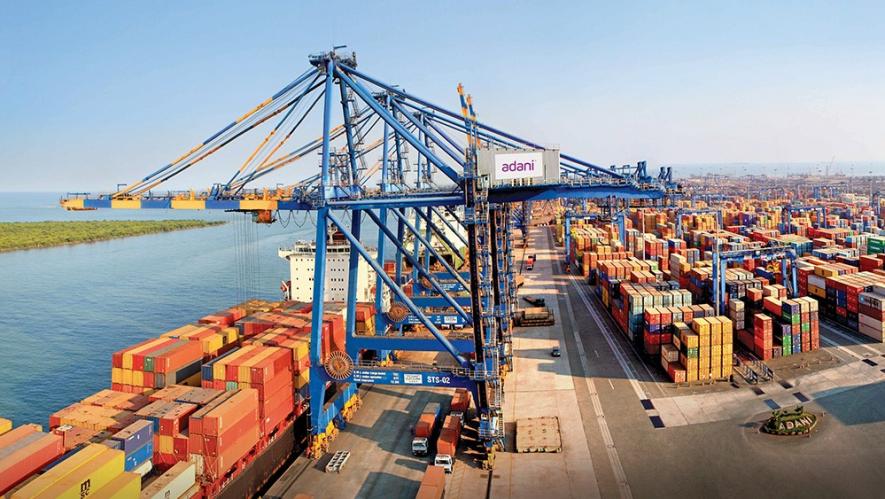INDIA
In Last Decade, 14% ‘Concerning’ Growth in Cargo Handled by Adani Ports

Adani Ports and Special Economic Zone Limited (APSEZ) has a coastal network rivalling that of the government’s 12 ports with the company having a presence every 500 km on an average along the country’s 5,422-km coastline.
The phenomenal expansion from only the Mundra Port in 2001 to 14 ports and terminals handling 24% of all cargo passing through the country’s ports has become a cause of concern in certain sections of the government, according to an investigative report of The Indian Express.
“This is a concern. Such a growth model compounds the concerns about the growing concentration risk,” a top economic ministry official requesting anonymity told the newspaper.
The figures of the total cargo handled by APSEZ and the Adani Group’s market share in the last 10 years show a massive increase.
From 2013 to 2023, the total cargo handled by APSEZ jumped nearly fourfold to 337 million tonnes (MT). Its volumes increased at a compounded annual growth rate (CAGR) of 14% against the industry’s 4%.
In contrast, the total cargo volume of all other ports grew at a CAGR of merely 2.7% from 842.66 MT to 1,096.39 MT.
The Group’s market share in total cargo handled almost tripled from around 9% to almost 24% in the same period. The Mundra Port handled 155 MT in FY23, more than any of the 12 government-owned ports.
On the other hand, the Centre’s market share dropped from around 58.5% to 54.5%.
Moreover, Adani’s market share has crossed 50% in ports not controlled by the Centre.
The increase in Adani Group’s market share in the ports sector has come at the cost of Centre-controlled ports, according to the newspaper.
Strikingly, this growth has been through the inorganic route, according to the officials and the regulator.
The Adani Group’s acquisition of ports in the last decade account for 37% of the total cargo volumes (337 MT), according to an analysis of cargo handling data by the newspaper.
The Group’s spokesperson didn’t reply to mails sent by the newspaper for comments on its expanding footprint and concentration risks.
APSEZ also beats the government in turnaround time, the duration between entry and exit of a cargo ship, taking only around 0.7 days compared to two days taken by the Centre in August.
While APSEZ is well-managed and a profitable business, a senior official with the shipping ministry flagged substantive risks of high market concentration, meaning low competition, high-entry barriers for newer and smaller players, high dependencies on dominant players, and higher chances of abuse of dominant position.
The Hindenburg Research and Organised Crime and Corruption Reporting Project reports alleging accounting fraud and stock manipulation by the Group are also a reason for concerns.
Another senior official from an economic ministry requesting anonymity said that the reports—denied by the Group as “motivated”—have increased anxiety about this market concentration in a strategic sector like shipping.
In 2013, APZEZ handled cargo volumes of around 91 MT, only 10% of the total volumes handled by all ports and more than 23% handled by all minor ports (not controlled by the government).
By 2023, the Group has a significantly higher footprint with its eight operational minor ports in India handling around 337 MT as against 650 MT handled by the minor ports, according to the newspaper.
APSEZ also operates terminals at three major ports. The Vizhinjam port (Kerala) and a terminal at the Syama Prasad Mookerjee Port (Haldia) are under construction. The company also acquired the Karaikal Port (Puducherry) in April—but since it was not part of the Adani Group in FY23, its volumes are not included in Adani’s total market share.
In the last 10 years, APSEZ’s volumes registered higher growth than compared to all major and minor ports. In FY21, when the overall port volumes and volumes at major and minor ports contracted by more than 4%, APSEZ’s volumes increased by around 11% compared to FY20.
ASPEZ’s growth was fuelled by the acquisition of Dhamra Port in Odisha, Kattupalli in Tamil Nadu, Krishnapatnam and Gangavaram in Andhra Pradesh and Dighi in Maharashtra.
According to a former Competition Commission of India (CCI) chairperson, APSEZ’s “share has been continuously growing in a creeping fashion. It is definitely a concern if there is a creeping acquisition of capacity by one player while the others fall or languish”.
In 5-10 year, it “could be a problem. The government and the CCI should keep an eye”, the chairperson said requesting anonymity.
Another former CCI chairperson differed saying that a company’s growth in “natural monopolies” like ports and airports isn’t worrying. The CCI’s only intervenes if there is evidence of “abuse of monopoly”.
The CCI didn’t respond to mails requesting it views on the matter.
No comments:
Post a Comment